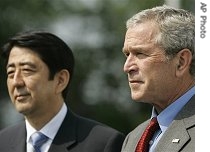2007年VOA标准英语-Japan, US Want G8 to Put More Pressure on North(在线收听)
Rostock, Germany
06 June 2007
Japan and the United States want the world's leading industrialized nations to put more pressure on North Korea to comply with an international agreement aimed at ending its nuclear weapons program. VOA White House Correspondent Scott Stearns reports from Germany, where Japanese Prime Minister Shinzo Abe and U.S. President George Bush met to discuss the matter ahead of the start of the G8 summit.
 |
| U.S. President Bush (r)accompanied by Japanese Prime Minister Shinzo Abe, make remarks after their meeting at the start of the G8 Summit in Heiligendamm, Germany, 06 Jun 2007 |
Mr. Abe said he wants G8 leaders to bring more pressure to bear on Pyongyang to meet its nuclear obligations and resolve the dispute over Japanese civilians abducted by North Korean agents.
"Unfortunately, the North Koreans have not done anything to implement the initial actions," said Mr. Abe. "And also on the issue of abduction, they have not taken any sincere actions to resolve that issue. So we agreed that the G8 leaders need to send a strong message to North Korea on these issues."
President Bush said G8 leaders have a common message that they expect North Korea to honor the nuclear agreement reached with the United States, Russia, China, Japan, and South Korea. The deal supplies fuel oil to North Korea in return for it shutting down its nuclear reactors and allowing international inspectors to verify the move.
North Korea says it will not close its reactors until it receives $25 million from a North Korean account in a Macau bank that was frozen in 2005 after Washington said the funds were tied to money laundering.
The Bush administration says it unfroze those funds in March. But because the money is tainted by charges of money laundering, some reputable banks in China and America have refused to handle the funds, complicating the transfer to North Korea.
Russia's deputy foreign minister says his country will work to help resolve the issue if the United States ensures that sanctions will not be used against Russian banks in the future.